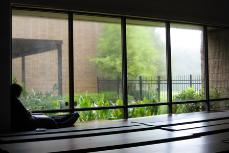Two days before Hurricane Katrina tore through New Orleans, an estimated 150 to 200 Loyola students evacuated with Residential Life. Three days before Hurricane Gustav, Loyola was responsible for only 15 students.
Seven Residential Life administrators drove students who were unable to leave the city to St. Michael the Archangel High School in Baton Rouge, La., where Gustav caused considerable wind damage.
“We knew that Baton Rouge was probably going to get hit,” said Kathy Scribner, Carrollton Hall residential assistant and history junior. “But I knew that Res Life wouldn’t put us in any true danger, and it was better to be there than New Orleans.”
Robert Reed, director of Residential Life, said that the smaller group of students resulted from an extra day of preparation and stressing to parents during orientation that they had to have an evacuation plan.
Students and Reed both agree that things were fine until the storm hit.
“When we first got there, everything was OK,” said Aubrey Lynne, music business senior. “I was getting used to it, I think everything was getting used to it. Things were good, we had good air conditioning … and then the power went out.”
With no air conditioning, condensation began to collect in the room where the students slept on air mattresses. Everything, from blankets to clothes, got damp. The group only had flashlights, so they spent a lot of time in the dark. “A generator would’ve been nice,” Lynne said. “And bigger light sources, too. … It would’ve been nice to have a portable gas grill, something where you can heat up food because we had Chef Boyardee and chili, and we had to eat it cold.”
A few students were able to evacuate elsewhere, but the rest of the group returned to campus Sept. 4 – three days before the university opened – to stay on the 12th floor of Buddig Hall.
Because they were in a situation with no power Marcia “Cissy” Petty, vice president for Student Affairs and associate provost, and the Rev. Kevin Wildes, S.J., university president, decided they could come back, Reed said.
“We were not allowed to leave the floor. … No one was supposed to come back because of security,” Martha Marr, an exchange student from Germany, said.
“We went outside the building two times a day to get lunch and dinner together,” she said.
Both Marr and Lynne went into great detail about the meals that university police and the kitchen staff prepared for them.
“Our first day, they actually cooked us a barbeque, which was really nice. They went really out of their way. … It was my first good meal after a week.” They ate salad, chicken and vegetables in the Orleans Room, as compared to chips, tuna and granola bars in Baton Rouge.
“We were just eating, eating, eating,” said Marr.
Marr said in the event of another evacuation she would avoid evacuating with the university if she can help it.
“Road trip!” she said. “Rent a car and go somewhere. … Sunday evening, we realized that Ike might become a serious problem,” she said. “We didn’t want to go with Loyola again. We don’t want to be locked up in a gym again.”
“But all in all, it was better than I expected,” she said.
“They were asking us what can we do better, and they were asking us how we were,” Lynne said.
“Mr. Reed was absolutely amazing,” Scribner said. “He didn’t have to be with us. … He could’ve stayed with his family, but he chose to be with us.”
“After every situation like this,” Reed said, “we evaluate the pros and cons and see what we can do better. It was much better since Katrina. … Everybody’s safe, so that was the real goal.”
Katie Urbaszewski can be reached at ceurbasz@loyno.edu.






